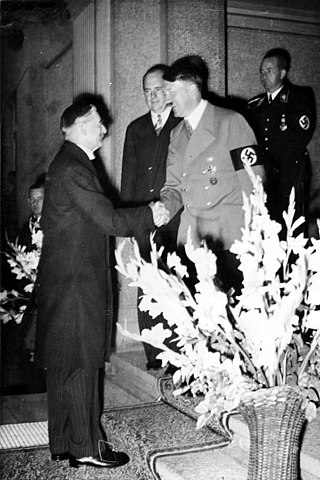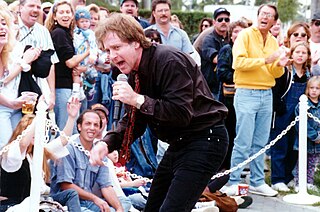
Jingoism is nationalism in the form of aggressive and proactive foreign policy, such as a country's advocacy for the use of threats or actual force, as opposed to peaceful relations, in efforts to safeguard what it perceives as its national interests. Colloquially, jingoism is excessive bias in judging one's own country as superior to others – an extreme type of nationalism.

Appeasement, in an international context, is a diplomatic policy of making political, material, or territorial concessions to an aggressive power to avoid conflict. The term is most often applied to the foreign policy of the British governments of Prime Ministers Ramsay MacDonald, Stanley Baldwin and Neville Chamberlain towards Nazi Germany and Fascist Italy between 1935 and 1939. Under British pressure, appeasement of Nazism and Fascism also played a role in French foreign policy of the period but was always much less popular there than in the United Kingdom.

Jeffrey Allen Ament is an American musician and songwriter who is best known as the bassist of the American rock band Pearl Jam, which he co-founded alongside Stone Gossard, Mike McCready, and Eddie Vedder.
Out of This World may refer to:

Gorky Park or Парк Горького is a Russian hard rock band that gained mainstream popularity in the United States during Perestroika. Gorky Park is famous for its kitsch use of western stereotypes of Russians, such as pseudo-traditional clothing, balalaika-like guitar design and the hammer and sickle as their logo. It was the first Russian band to be aired on MTV.

"Peace for our time" was a declaration made by British Prime Minister Neville Chamberlain in his 30 September 1938 remarks in London concerning the Munich Agreement and the subsequent Anglo-German Declaration. The phrase echoed Benjamin Disraeli, who, upon returning from the Congress of Berlin in 1878, had stated, "I have returned from Germany with peace for our time".
Mirror Mirror may refer to:
Carnival is a festive season occurring immediately before Lent.

Weldon Dean Parks is an American session guitarist and record producer from Fort Worth, Texas.

The discography of American rock musician Eddie Money consists of 11 studio albums, two live albums, four EPs, and 28 singles. He also released seven compilation albums.
"Peace with Honor" was a phrase U.S. President Richard M. Nixon used in a speech on January 23, 1973 to describe the Paris Peace Accords to end the Vietnam War. The phrase is a variation on a campaign promise Nixon made in 1968: "I pledge to you that we shall have an honorable end to the war in Vietnam." The Accords specified that a ceasefire would take place four days later. According to the plan, within sixty days of the ceasefire, the North Vietnamese would release all U.S. prisoners, and all U.S. troops would withdraw from South Vietnam. On March 29, 1973, the last U.S. soldier left Vietnam. On 30 April 1975, Saigon fell to North Vietnamese troops.

Big Country are a Scottish rock band formed in Dunfermline, Fife, in 1981.

Gorky Park is the debut album by Russian hard rock band Gorky Park, released in 1989 by Mercury Records, after Jon Bon Jovi & Richie Sambora of Bon Jovi expressed interest in the band and got them signed to Mercury, Bon Jovi's label. It features the band's first hit single, "Bang", that has a mix of Russian and English lyrics and was put into rotation on MTV.
"Peace in Our Time" is a song written by English songwriters Andy Hill and Peter Sinfield, first recorded by American actress Jennifer Holliday for the 1988 Summer Olympics album One Moment in Time. The song was later covered by American rock singer Eddie Money and English singer Cliff Richard.

"Broken Heart " is a song by Scottish rock band Big Country, which was released in 1988 as the second single from their fourth studio album Peace in Our Time. It was written by Stuart Adamson and produced by Peter Wolf. "Broken Heart " reached No. 47 in the UK and remained in the charts for four weeks. A music video was filmed to promote the single. It was directed by Richard Lowenstein and shot near Wittenoom, Western Australia.

"Peace in Our Time" is a song by Scottish rock band Big Country, which was released in 1989 as the third and final single from their fourth studio album Peace in Our Time (1988). It was written by Stuart Adamson and produced by Peter Wolf. "Peace in Our Time" reached No. 39 in the UK and remained in the charts for three weeks. A music video was filmed to promote the single.
This page is based on this
Wikipedia article Text is available under the
CC BY-SA 4.0 license; additional terms may apply.
Images, videos and audio are available under their respective licenses.










